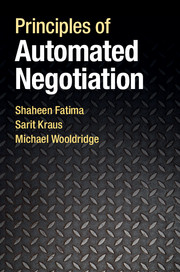Book contents
- Frontmatter
- Dedication
- Contents
- List of illustrations
- Preface
- Acknowledgements
- Summary of key notation
- 1 Introduction
- 2 Games in normal form
- 3 Games in extensive form
- 4 Negotiation domains
- 5 Strategic analysis of single-issue negotiation
- 6 Strategic analysis of multi-issue negotiation
- 7 The negotiation agenda
- 8 Multilateral negotiations
- 9 Heuristic approaches
- 10 Man–machine negotiations
- 11 Axiomatic analysis of negotiation
- 12 Applications
- 13 Related topics
- 14 Concluding remarks
- Appendix A Proofs
- References
- Index
7 - The negotiation agenda
Published online by Cambridge University Press: 05 November 2014
- Frontmatter
- Dedication
- Contents
- List of illustrations
- Preface
- Acknowledgements
- Summary of key notation
- 1 Introduction
- 2 Games in normal form
- 3 Games in extensive form
- 4 Negotiation domains
- 5 Strategic analysis of single-issue negotiation
- 6 Strategic analysis of multi-issue negotiation
- 7 The negotiation agenda
- 8 Multilateral negotiations
- 9 Heuristic approaches
- 10 Man–machine negotiations
- 11 Axiomatic analysis of negotiation
- 12 Applications
- 13 Related topics
- 14 Concluding remarks
- Appendix A Proofs
- References
- Index
Summary
In the previous chapter, we took the agenda as given and studied the strategic behaviour of agents for the different multi-issue negotiation procedures. This study showed that, for a given agenda, the procedure is a key determinant of the outcome of a negotiation. In this chapter, we will learn the importance of the agenda: we will treat the procedure as given and see how the outcome of a negotiation can be changed by changing the agenda.
Given this influence, an economic agent will clearly prefer an agenda that maximises her individual utility. Such an agenda is called the agent's optimal agenda. But it may not always be computationally easy to find such an agenda. Thus, we will focus on some specific negotiation settings and study polynomial-time methods for finding an optimal agenda. These methods have both economic and computational significance: by using them, a player will be able to maximise her utility, and the methods have computational feasibility. In other words, they facilitate the design of software agents that can not only negotiate optimally over a given set of issues, but also choose the right agenda before actual negotiation begins.
Let us begin by looking at some example scenarios where the parties must choose an agenda for negotiation.
Information
- Type
- Chapter
- Information
- Principles of Automated Negotiation , pp. 121 - 138Publisher: Cambridge University PressPrint publication year: 2014
